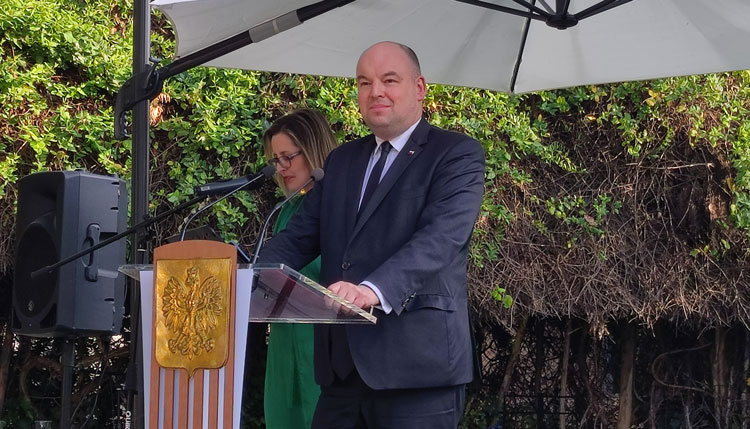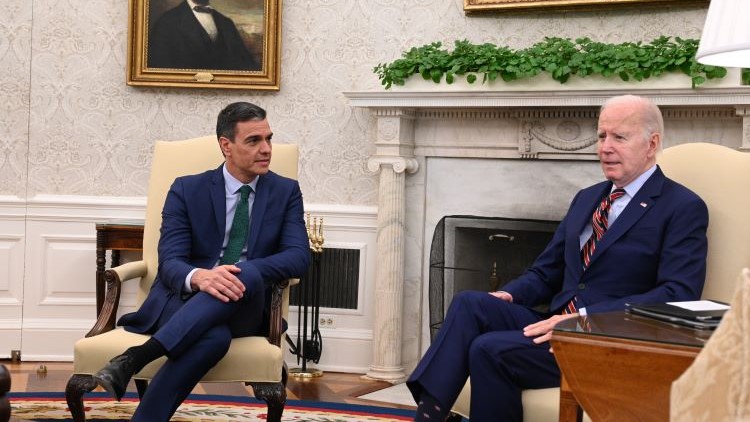Juan David Latorre
Ambassador Anna Sroka highlighted “the strategic, stable and growing relationship with Spain, as demonstrated by its permanent political dialogue, the increase in trade and mutual confidence of investors and military cooperation” at the reception held last Thursday at the Polish Embassy on the occasion of the National Constitution Day on 3 May.
The Polish ambassador went on to say that “the reason for this holiday, which we celebrate every year in May, is to commemorate the first Polish constitution, which was adopted by the Polish-Lithuanian Commonwealth on May 3, 1791. It was an unprecedented law not only in Poland, but in the whole of Europe. In fact, it was the second constitution adopted in the world. It was a progressive and bold act, which initiated a series of reforms. It also reflected the will to defend the independence of our state. Unfortunately, the ambitious reform plans were thwarted by Russia’s military intervention at the end of the eighteenth century.”
“Nevertheless,” Anna Sroka stressed, “the legacy of the May 3rd Constitution – freedom, democracy and solidarity – lives on. This act inspires cooperation and friendship between Poland and other countries to this day.
Referring to the war in Ukraine, which the ambassador described as “cruel Russian aggression”, she noted that “the unity and cooperation of close allies is especially important. That is why Poland values so much its strategic, stable and growing relationship with Spain, as demonstrated by its permanent political dialogue, increased trade and mutual trust of investors and military cooperation. Together we are building the strength of Europe and NATO, together we are opposing the imperial policy of the Kremlin.
Next to speak was the Secretary of State in the Polish Prime Minister’s Chancellery, Jan Dziedziczak, who first of all explained the reason for his trip to Spain, namely the posthumous awarding by the Polish President, Andrzej Duda, of the highest state honours to Archduke Karl Albert Habsburg and his wife, Archduchess Alicja Elzbieta Habsburg, whose maiden name was Ankarcrona, of the Habsburgs of Zywiec. Two Honorary Consuls of Poland in Spain who are celebrating their twenty-fifth anniversary in office this year, Ramón Sentís Durán, Honorary Consul General of the Republic of Poland in Valencia, and Jerzy Maciej Zieleniewski, Honorary Consul of the Republic of Poland in Murcia, were also awarded the Insignias al Mérito para la Comunidad Polaca y Polacos en el Exterior (Badges of Merit for the Polish Community and Poles Abroad). “Two examples, noted the Polish Secretary of State, those of the Habsburg princes and honorary consuls, which show that patriotism and loyalty are not limited only to ties of blood, spirit and heart.”
Jan Dziedziczak further noted that “today’s borderless Europe is multinational. It is a unity in diversity. Each of us, and you as diplomats representing your countries understand this particularly well, is defined by our homeland of birth, history, culture, traditions and current affairs. A homeland by birth, but also by choice, as Spain is for the Polish community and the Poles living here. They, our diasporas scattered around the world (20 million people), are the greatest allies of yours, of diplomats, the natural ambassadors of the places they come from and the places they have chosen, the real actors of international friendship, mutual understanding and cooperation. However, acceptance of diversity, mutual understanding and international collaboration require respect for basic and common rules. These rules include independence and state sovereignty, as well as solidarity with those who fight in its defence, a value of particular importance and relevance for us Poles.
Also, and unsurprisingly, the Secretary of State referred to the Russian invasion of Ukraine. Today,” said Jan Dziedziczak, “Poland is working hand in hand with Ukraine, which has been savagely attacked by Russia. This savage attack has no borders, no limits. Since the beginning of the war, the Polish border has been crossed by 13 million women and children, 13 million human dramas. 13 million examples of Polish solidarity. The largest number of refugees after the Second World War. Despite this number, there are no refugee camps in Poland. 85% of these refugees have found shelter in private homes of our citizens. We spend 2% of our GDP on aid for Ukraine and Ukrainians. Let us show Putin that the free world is against Russian aggression. Let us stand in solidarity with Ukraine, no matter where we are from and no matter where we come from, for the good and security of us all.
The event was attended by the ambassadors of Croatia, Switzerland, Finland, Australia, Azerbaijan, Luxembourg, Armenia, Nicaragua, Romania, Austria, Lithuania, the Philippines, Qatar, Slovakia, the Czech Republic and Kazakhstan, among many others, as well as numerous members of the Polish community in Spain.











